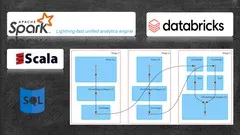
Administering Clusters and Configuring Policies with Databricks Service 
This course provides an overview of administering clusters and configuring policies in Databricks Service, helping users optimize performance and manage costs. ▼
ADVERTISEMENT
Course Feature
![]() Cost:
Cost:
Free Trial
![]() Provider:
Provider:
Pluralsight
![]() Certificate:
Certificate:
Paid Certification
![]() Language:
Language:
English
![]() Start Date:
Start Date:
On-Demand
Course Overview
❗The content presented here is sourced directly from Pluralsight platform. For comprehensive course details, including enrollment information, simply click on the 'Go to class' link on our website.
Updated in [April 29th, 2023]
What does this course tell?
(Please note that the following overview content is from the original platform)
Clusters are at the heart of most tasks in Databricks, and configuring them precisely is crucial to ensuring optimum performance while also managing costs. This course covers how cluster policies can be used to help meet these goals.
Administering a Databricks workspace involves a wide variety of tasks, but one with far-reaching consequences which is often neglected is the management of clusters and cluster policies. In this course, Administering Clusters and Configuring Policies with Databricks Service, you'll explore how to effectively manage clusters and policies in Databricks which helps ensure teams run their jobs in a consistent environment while keeping costs down to manageable levels. First, you'll learn the need for cluster policies, and specifically how these can help control costs while still allowing users to run their jobs efficiently. Next, you'll explore how rules can be set to restrict access to specific Databricks resources, such as instance pools, clusters, and notebooks. Then, you'll discover how cluster policies can be framed and applied programmatically. Finally, you'll learn how to generate a personal access token to interact with Databricks using the REST API, and cover how this can be used to define policies, as well as clusters built by applying them. Once you complete this course, you'll recognize exactly why cluster policies are required, how these can be defined and rolled out in an organization, and how these can be managed with the Databricks REST API.
We consider the value of this course from multiple aspects, and finally summarize it for you from three aspects: personal skills, career development, and further study:
(Kindly be aware that our content is optimized by AI tools while also undergoing moderation carefully from our editorial staff.)
Online learning is an effective way to acquire new skills and knowledge. This course, Administering Clusters and Configuring Policies with Databricks Service, provides learners with the opportunity to learn how to effectively manage clusters and policies in Databricks. Learners will gain an understanding of the need for cluster policies, how to set rules to restrict access to specific Databricks resources, and how to frame and apply policies programmatically. Additionally, learners will learn how to generate a personal access token to interact with Databricks using the REST API, and how to use this to define policies and clusters. By the end of the course, learners will have the skills and knowledge to effectively administer clusters and configure policies with Databricks Service.
[Applications]
Upon completion of this course, learners should be able to apply their knowledge of administering clusters and configuring policies with Databricks Service to their own projects. Learners should be able to understand the need for cluster policies, set rules to restrict access to Databricks resources, frame and apply cluster policies programmatically, and generate a personal access token to interact with Databricks using the REST API.
[Career Paths]
1. Databricks Administrator: Databricks Administrators are responsible for managing the Databricks platform, including setting up and configuring clusters, managing user access, and ensuring the platform is running optimally. Developing trends for this role include the use of automation and machine learning to streamline the administration process, as well as the use of cloud-based solutions to reduce costs and improve scalability.
2. Data Engineer: Data Engineers are responsible for designing, building, and maintaining data pipelines and data warehouses. Developing trends for this role include the use of cloud-based solutions to reduce costs and improve scalability, as well as the use of machine learning and artificial intelligence to automate data processing tasks.
3. Data Scientist: Data Scientists are responsible for analyzing data and developing models to solve business problems. Developing trends for this role include the use of deep learning and natural language processing to automate data analysis tasks, as well as the use of cloud-based solutions to reduce costs and improve scalability.
4. DevOps Engineer: DevOps Engineers are responsible for automating the deployment and management of applications and services. Developing trends for this role include the use of containerization and serverless computing to reduce costs and improve scalability, as well as the use of machine learning and artificial intelligence to automate DevOps tasks.
Course Provider

Provider Pluralsight's Stats at AZClass
Pluralsight ranked 16th on the Best Medium Workplaces List.
Pluralsight ranked 20th on the Forbes Cloud 100 list of the top 100 private cloud companies in the world.
Pluralsight Ranked on the Best Workplaces for Women List for the second consecutive year.
AZ Class hope that this free trial Pluralsight course can help your Databricks skills no matter in career or in further education. Even if you are only slightly interested, you can take Administering Clusters and Configuring Policies with Databricks Service course with confidence!
Discussion and Reviews
0.0 (Based on 0 reviews)
Explore Similar Online Courses

Power BI Training

Real Estate Photography Masterclass

Python for Informatics: Exploring Information

Social Network Analysis

Introduction to Systematic Review and Meta-Analysis

The Analytics Edge

DCO042 - Python For Informatics

Causal Diagrams: Draw Your Assumptions Before Your Conclusions

Whole genome sequencing of bacterial genomes - tools and applications

Databricks Fundamentals & Apache Spark Core

Databricks Essentials for Spark Developers (Azure and AWS)


Start your review of Administering Clusters and Configuring Policies with Databricks Service